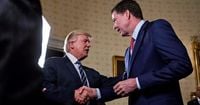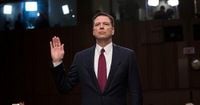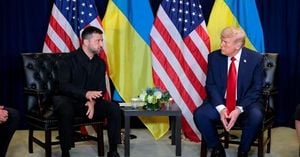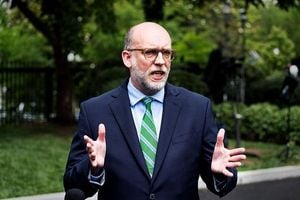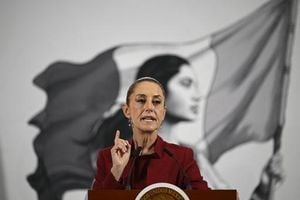James Comey, the former FBI Director who became a lightning rod during the investigations into Russian interference in the 2016 U.S. presidential election, is now at the center of a rapidly developing legal and political storm. Federal prosecutors in the Eastern District of Virginia are preparing to seek a grand jury indictment against Comey on charges of perjury, with the decision expected within days as the five-year statute of limitations for such charges nears its expiration, according to multiple reports from MSNBC, CNN, and The Independent.
The potential indictment stems from Comey’s testimony to Congress on September 30, 2020. During that hearing, Comey denied authorizing the release of certain information related to the FBI’s investigation into Russian meddling in the 2016 election. Prosecutors are now scrutinizing whether that denial constituted a false statement under oath—a serious criminal offense if proven. As reported by The Economic Times, the full scope of the charges remains unclear, but the central allegation is that Comey may have lied or misled Congress about his actions while leading the FBI.
This legal maneuver comes at a moment of heightened political tension. President Donald Trump’s administration has long harbored animosity toward Comey, viewing him as emblematic of what Trump and his allies deride as the federal government’s “deep state.” Trump’s public calls for Comey’s prosecution have only intensified in recent weeks, with the president taking to social media to demand action. In one post, he wrote, “Pam: I have reviewed over 30 statements and posts saying that, essentially, ‘same old story as last time, all talk, no action. Nothing is being done,’” before concluding, “JUSTICE MUST BE SERVED, NOW!!!” as cited by The Independent.
The political overtones of the case have only grown sharper following a dramatic leadership shakeup at the U.S. Attorney’s office in the Eastern District of Virginia. Erik Siebert, the former U.S. Attorney overseeing the case, was abruptly fired by President Trump after he hesitated to bring mortgage fraud charges against New York Attorney General Letitia James—another Trump adversary. According to The Independent and CNN, Siebert’s ouster was also linked to the fact that Virginia’s Democratic senators had supported his nomination earlier in the year, a move that reportedly angered Trump.
Into this charged environment stepped Lindsey Halligan, a former personal attorney to Trump and a loyalist with little prosecutorial experience. Halligan was appointed acting U.S. Attorney for the Eastern District of Virginia in September 2025, just as the deadline for bringing charges against Comey loomed. Halligan’s appointment has raised eyebrows among legal observers, given her lack of background in national security or federal court cases—a notable gap for a district that frequently handles high-profile, sensitive matters due to its proximity to Washington, D.C. As The Independent noted, Halligan previously served as a White House aide and was part of the effort to “Trumpify” the Smithsonian Institution.
Halligan’s arrival coincides with other signs of direct presidential involvement in the Justice Department’s work. Special prosecutor Ed Martin, another Trump ally, is reportedly bypassing the usual DOJ chain of command and reporting directly to the president as he participates in the investigation, according to The Independent. This unusual arrangement has frustrated some senior Justice Department officials, who see it as a potential breach of the department’s traditional independence from the White House.
The allegations against Comey are rooted in a long and contentious history between him and Trump. Comey was fired by Trump in 2017—a move that shocked Washington and led to the appointment of Special Counsel Robert Mueller to continue the Russia investigation. During his brief tenure under Trump, Comey took detailed memos of his meetings with the president, some of which were later leaked to the press. In a 2017 Senate hearing, Comey admitted he had asked a friend, Columbia University law professor Daniel Richman, to share information from the memos with a reporter. A subsequent Department of Justice inspector general report found that Comey violated agency policies by leaking the memos but did not find evidence that he had released classified information.
Comey’s 2020 testimony, now under scrutiny, saw him reiterate that he had not authorized leaks to the media. He has consistently maintained his innocence, stating under oath that he has “been truthful” in his congressional appearances. His attorney has not responded to recent requests for comment, as reported by CNN.
The political context surrounding the investigation is impossible to ignore. Trump and his allies have frequently accused Comey of bias and wrongdoing, casting him as a central figure in what they describe as efforts to undermine the Trump presidency. The president’s recent installation of loyalists like Halligan into key Justice Department roles has fueled accusations of politicization from critics, who warn that the independence of the DOJ is at risk. Supporters of the investigation, however, argue that holding public officials accountable—regardless of their political affiliations—is a necessary safeguard for democracy.
Beyond the immediate legal jeopardy for Comey, the case is likely to have far-reaching implications for American institutions. If Comey is indicted and ultimately convicted, he could face penalties ranging from fines to imprisonment. More broadly, the case may deepen existing divisions over the role of the Justice Department, the boundaries of presidential power, and the standards to which public officials are held. Legal experts and political observers are watching closely, with many warning that the outcome could set lasting precedents for how the U.S. government polices itself.
Meanwhile, the drama has spilled over into the public arena. Comey recently drew scrutiny after posting a photo on social media of seashells arranged to read “86 47,” which Trump and his supporters interpreted as a veiled threat. Comey denied any such intent and voluntarily sat for an interview with the Secret Service to address the controversy, as CNN reported.
As the clock ticks down toward the statute of limitations deadline, the Justice Department’s decision on whether to proceed with charges against Comey is imminent. The stakes could hardly be higher—not just for Comey, but for the broader debate over justice, accountability, and political retribution in the United States. All eyes are now on the Eastern District of Virginia, where the next chapter in this extraordinary saga is about to unfold.
